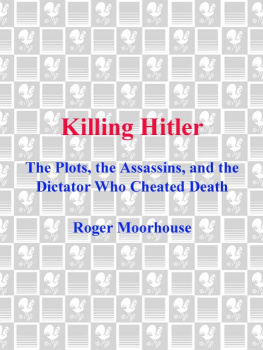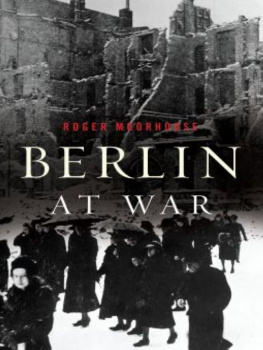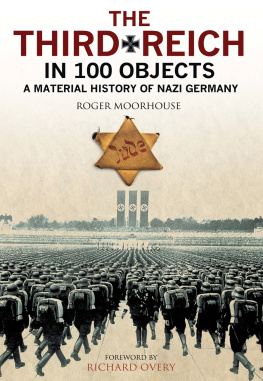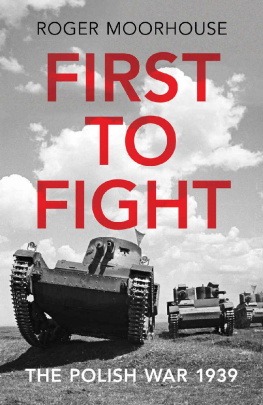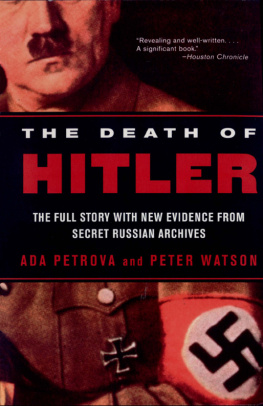Also by Roger Moorhouse
Microcosm:
Portrait of a Central European City
For
Melissa,
without whom
Acknowledgments
W riting is a strangely solitary existence. Yet any writer would concede that though the words on the page may be his, numerous personal debts are accrued in their preparation.
A number of individuals deserve special mention, therefore. At the research stage, Kate Gilbert provided great assistance. Krzysztof Boejewicz handled all Polish-language research, in both the UK and Poland, aided by Andrzej Koroski. In Germany, Angelica von Hase and Peter Steinkamp gave vital archival support, as did Dr. Luba Vinogradova in Russia. In addition, a number of specialists read and commented on chapters of draft text. These include Antony Beevor, Professor M. R. D. Foot, Dr. Ted Harrison, Gitta Sereny, and Dr. Jacek Tebinka. Others who provided assistance, responded to queries, and are otherwise deserving of mention include Dr. Andreas von Breitenbuch, Dr. Bogdan Chrzanowski, Ewa Huggins, Ute Krebs, David List, Eugenia Maresch, Dr. Iwona Sakowicz, Roy Seaton, Dr. Andrzej Suchcitz, Dr. Hilary Willard, and Dr. Wanda Wyporska.
A number of institutions should also be mentioned, including the British Library Newspaper Archive, the Gedenksttte Deutscher Widerstand, the Bundesarchiv in Berlin, the Bundesarchiv (Militrarchiv) in Freiburg, the German Historical Institute in London, the Imperial War Museum Archive, the Polish Underground Movement Study Trust, and the Wiener Library.
Particular praise is reserved for the British Library and the National Archives in London. Having worked for many years as a researcher, I have extensive experience of working in archives and libraries across Europe and have come to the conclusion that these two institutions are without equal. There are, regrettably, few areas in which Britain can still claim to be world-class, but the British Library and the National Archives set a new benchmark in their efficiency, the competence and expertise of their staff, and the excellence of their working environment.
Three special debts must be acknowledged. Will Sulkin and Jrg Hensgen of Jonathan Cape were unflagging in their enthusiasm for the project, and my agent, Peter Robinson, was consistently supportive and negotiated the publishing deal that made it all possible. I would also like to thank Professor Norman Davies, who inspired me to embark on this path in the first place.
Lastly, I would like to thank my wife, Melissa. Hitler has been a part of our livesthe mustachioed elephant in our living roomfor a long time now, and by way of apology for this intrusion, I feel it appropriate that I dedicate this book to her.
Contents
Chapter 1
Maurice Bavaud: Gods Assassin
Chapter 2
Georg Elser: The Lone Bomber
Chapter 3
The Abwehr: The Enemy Within
Chapter 4
The Nest of Vipers: The Polish Underground
Chapter 5
The Implacable Foe: The Soviet Union
Chapter 6
The Dirty War: The British and the Special Operations Executive
Chapter 7
Honor Redeemed: The German Military
Chapter 8
Revolt of the Acolyte: Albert Speer
Introduction
I might be killed by a criminal, or by an idiot, at any time.
A DOLF H ITLER
A SSASSINATION, IT WAS ONCE SAID, HAS NEVER CHANGED the history of the world. This benign sentiment, often repeated in times of crisis, is wishful nonsense, however. In response, one might point most obviously to the killing of Archduke Franz Ferdinand in Sarajevo, which unleashed the First World War, or to the murder of Sergei Kirov in 1934, which sparked the murderous purges in Stalins Soviet Union. Assassination clearly has the capacity to affect world events.
More recently, the question of the utility of assassination as a political weapon has been subjected to closer examination. An analysis of eighteen famous assassinations through the ages concluded that not one of them achieved their wider political aims. Indeed, in many cases, the results were the exact opposite of those intended. The murder of President Lincoln in 1865, for example, by a southern sympathizer proved disastrous for the American South, while the assassination of Lord Cavendish by Irish nationalists in 1882 set the cause of Irish independence back by a generation. Assassinations, therefore, have certainly changed history; they have just never changed it in the way foreseen by the assassin.
Yet the possibility that Hitler could have been assassinated is one that has tantalized historians and fiction writers alike. It is tempting to speculate not only on the number of lives that could have been saved, the conflict that might have been avoided, and the suffering that perhaps would have been spared, but also on how differently European, and especially German, history might have played out in the twentieth century had Hitler been successfully felled by an assassins bullet. Surely here, if nowhere else, is a case where an assassination might actually have brought the benefits intended by the assassin.
The majority of modern readers would probably agree, instinctively at least, with that statement. But it is interesting to note that unanimity on this issue was much harder to find during Hitlers lifetime. Then, discussions raged over the propriety of playing God, the setting of dangerous precedents, the thorny concepts of principled treachery and state-sanctioned terrorism, and the question of what further horrors might have followed Hitlers premature demise. Surprisingly, perhaps, the proposal to assassinate Hitler was never anything less than highly controversial.
Yet, for all these concerns, Hitlers would-be assassins were not dissuaded. Few leaders, of any century, can have been the target of so many assassination attempts: no fewer than forty-two separate plots on Hitlers life have been identified by German historians, and even that list is far from complete. Of these, around twenty can be considered serious enough to warrant the attention given to them here.
Hitler was probably the most influential individual of the twentieth century. His name has become synonymous with brutality, intolerance, and racial hatred. His face, perhaps the most instantly recognizable and iconic image of the modern era, is one that feweven those blessed with living in peaceful timeswill ever forget. Yet what of his would-be assassins?
In some cases, the assassin and his victim are bound together in perpetuity by their moment of shared history. Thus John F. Kennedy has his Lee Harvey Oswald, Abraham Lincoln has his John Wilkes Booth, and Franz Ferdinand has his Gavrilo Princip. The assassins of history are sometimes lauded as heroes and are often vilified as the most bestial of criminals, but they are rarely forgotten.
Yet Hitlers would-be assassins are, for the most part, unknown. Of them, only the name Claus von Stauffenberg might expect to register any reaction from the reading public. For all of them, of course, their greatest failing was that they were unable to carry out their allotted taskthat of ridding the world of Adolf Hitlerbut they nonetheless deserve greater recognition. They deserve better than to exist only in the footnotes of history, better than the obscurity to which they have been condemned by time and fashion, and in many cases by their Nazi executioners.

